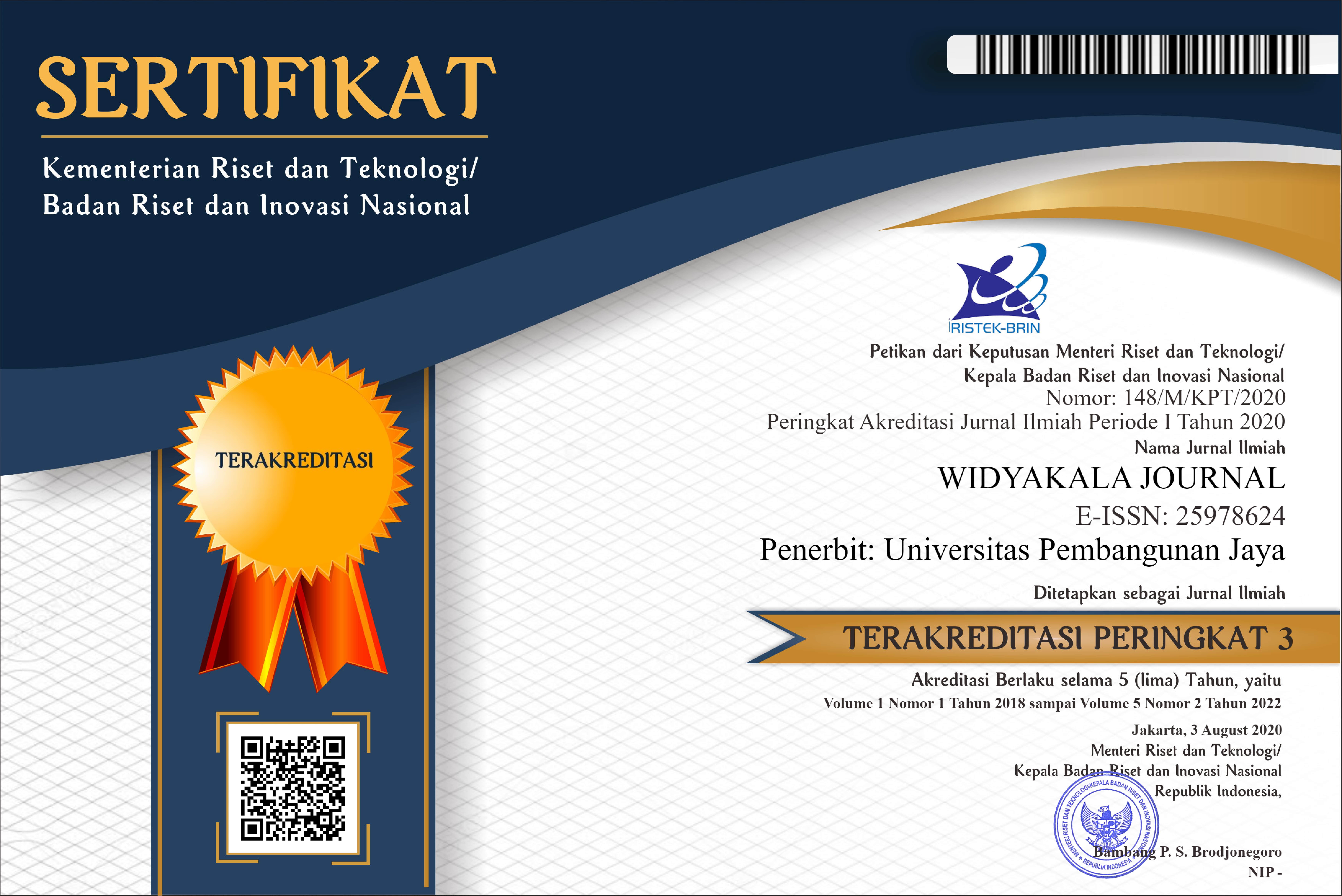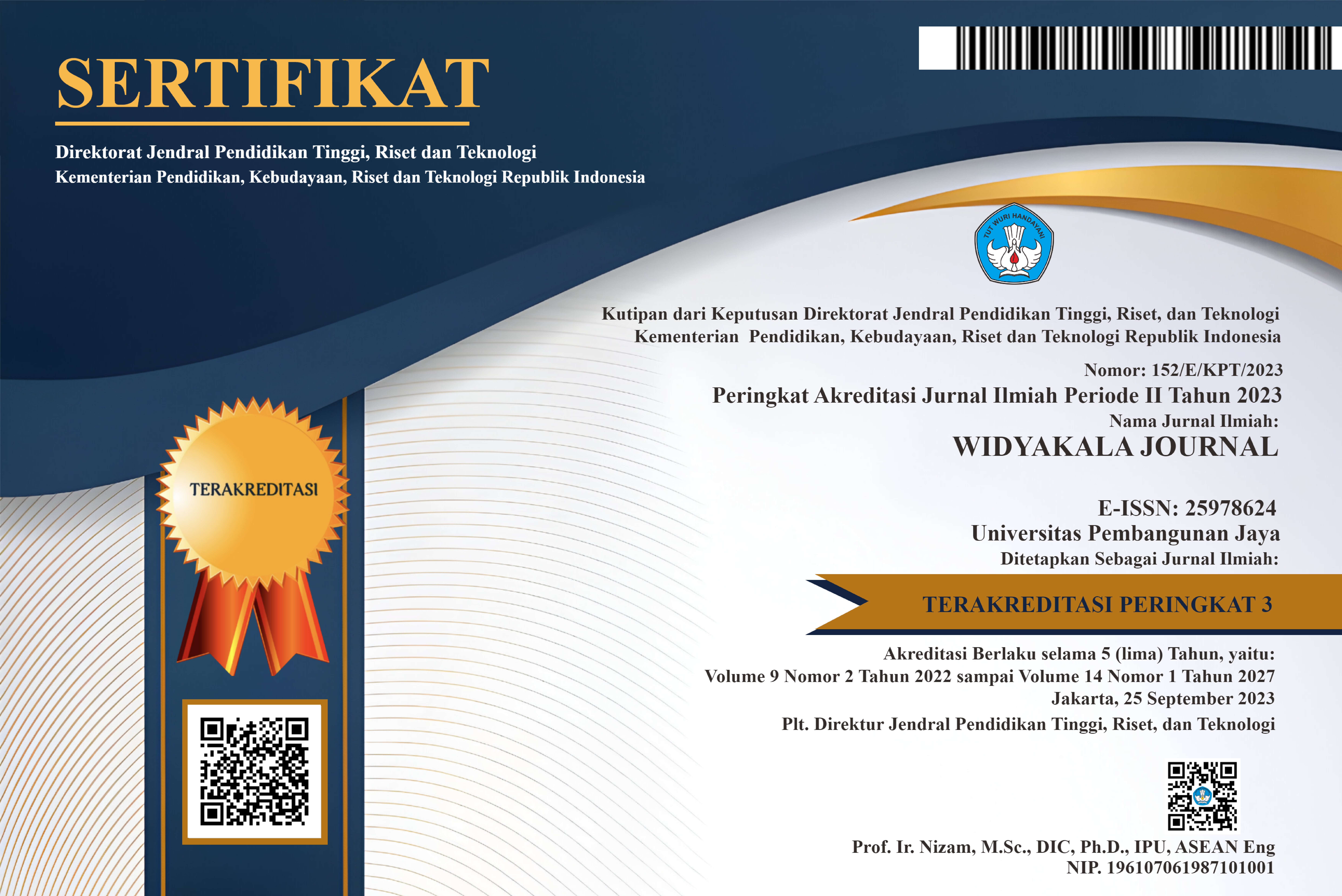Updated, March 2025
The Influence of Social Media Engagement on Spotify Users from Generation Z and Alpha: Examining the Moderating Role of FOMO
Abstract
Keywords
Full Text:
PDFReferences
Ahmed, N. (2019). Generation Z’s Smartphone and Social Media Usage: A Survey. Journalism and Mass Communication, 9(3), 101–122. https://doi.org/10.17265/2160-6579/2019.03.001
Alt, D. (2015). College students’ academic motivation, media engagement and fear of missing out. Computers in Human Behavior, 49, 111–119. https://doi.org/10.1016/j.chb.2015.02.057
Amir, M. T. (2005). Dinamika pemasaran: Jelajahi & rasakan. Raja Grafindo Persada.
Aprilia, Y., & Andarini, S. (2023). Pengaruh Product Quality dan Brand Trust terhadap Repurchase Intention Melalui Customer Satisfaction sebagai Variabel Intervening pada Produk Kecantikan Brand Somethinc. Al-Kharaj: Jurnal Ekonomi, Keuangan & Bisnis Syariah, 5(6), 3193–3205. https://doi.org/10.47467/alkharaj.v5i6.3649
Aprilian, D., Elita, Y., & Afriyati, V. (2020). Hubungan Antara Penggunaan Aplikasi Tiktok Dengan Perilaku Narsisme Siswa Kelas VIII Di SMP Negeri 8 Kota Bengkulu. Consilia : Jurnal Ilmiah Bimbingan Dan Konseling, 2(3), 220–228. https://doi.org/10.33369/consilia.2.3.220-228
Baker, Z. G., Krieger, H., & LeRoy, A. S. (2016). Fear of missing out: Relationships with depression, mindfulness, and physical symptoms. Translational Issues in Psychological Science, 2(3), 275–282. https://doi.org/10.1037/tps0000075
Balla, B. E., Ibrahim, S. B., Hafiez, A., & Hasaballah, A. (2015). THE IMPACT OF RELATIONSHIP QUALITY ON REPURCHASE INTENTION TOWARDS THE CUSTOMERS OF AUTOMOTIVE COMPANIES IN SUDAN. British Journal of Marketing Studies Vol.3, 3(4), 1–15.
Buss, D. M., & Chiodo, L. M. (1991). Narcissistic Acts in Everyday Life. Journal of Personality, 59(2), 179–215. https://doi.org/10.1111/j.1467-6494.1991.tb00773.x
Chang, S. C., Chou, P. Y., & Wen-Chien, L. (2014). Evaluation of satisfaction and repurchase intention in online food group-buying, using Taiwan as an example. British Food Journal, 116(1), 44–61. https://doi.org/10.1108/BFJ-03-2012-0058
Damar, A. M. (2023). Mirip Spotify Wrapped, Apple Music Replay 2023 Kini Sudah Bisa Diakses. https://www.liputan6.com/tekno/read/5467556/mirip-spotify-wrapped-apple-music-replay-2023-kini-sudah-bisa-diakses
Darmadi, R., Silitonga, P., & Kristiadi, A. Ag. (2021). Pengaruh Social Media Customer Engagement Dan Kepuasan Pelanggan Terhadap Loyalitas Merek Perguruan Tinggi Swasta. Widya Manajemen, 3(2), 166–177. https://doi.org/10.32795/widyamanajemen.v3i2.1692
Deandra Rafiq Daffa, Dave Arthuro, Jovanes Agus Fernanda, & Muh. Bintang Widya Pratama. (2024). Gen-Z: Eksplorasi Identitas Budaya dan Tantangan Sosial Dalam Era Digital. Jurnal Insan Pendidikan Dan Sosial Humaniora, 2(2), 169–183. https://doi.org/10.59581/jipsoshum-widyakarya.v2i2.3112
Dessart, L. (2017). Social media engagement: a model of antecedents and relational outcomes. Journal of Marketing Management, 33(5–6), 375–399. https://doi.org/10.1080/0267257X.2017.1302975
Dossey, L. (2014). FOMO, digital dementia, and our dangerous experiment. Explore: The Journal of Science and Healing, 10(2), 69–73. https://doi.org/10.1016/j.explore.2013.12.008
Elhai, J. D., Yang, H., & Montag, C. (2021). Fear of missing out (Fomo): Overview, theoretical underpinnings, and literature review on relations with severity of negative affectivity and problematic technology use. Brazilian Journal of Psychiatry, 43(2), 203–209. https://doi.org/10.1590/1516-4446-2020-0870
Emami, J., Lajevardi, M., & Fakharmanesh, S. (2013). An Integrated Model in Customer Loyalty Context: Relationship Quality and Relationship Marketing View. Australian Journal of Basic Applied Sciences, 7(2), 399–407. http://www.ajbasweb.com/ajbas/2013/February/399-407.pdf
Engkus, Hikmat, & Saminnurahmat, K. (2017). Perilaku Narsis pada Media Sosial di Kalangan Remaja dan Upaya Penanggulangannya. Jurnal Penelitian Komunikasi, 20(2), 121–134. https://doi.org/10.20422/jpk.v20i2.220
Exline, J. J., Bushman, B. J., Baumeister, R. F., Keith Campbell, W., & Finkel, E. J. (2004). Too proud to let go: Narcissistic entitlement as a barrier to forgiveness. Journal of Personality and Social Psychology, 87(6), 894–912. https://doi.org/10.1037/0022-3514.87.6.894
Fadlurrohim, I., Husein, A., Yulia, L., Wibowo, H., & Raharjo, S. T. (2020). Memahami Perkembangan Anak Generasi Alfa Di Era Industri 4.0. Focus : Jurnal Pekerjaan Sosial, 2(2), 178. https://doi.org/10.24198/focus.v2i2.26235
Felita, C. I., & Japarianto, E. (2015). Analisa Pengaruh Customer Experience Terhadap Customer Loyalty dengan Customer Engangement dan Customer Trust sebagai Variabel Intervening. Jurnal Manajemen Pemasaran, Vol.1(No.1), pp.1-10.
Freud, S. (1914). On Narcissism: An Introduction: Vol. XIV (Issue 2014). https://books.google.co.id/books?hl=id&lr=&id=ZXx-CgAAQBAJ&oi=fnd&pg=PT4&dq=On+Narcissism:+An+Introduction+Sigmund&ots=_A-tQL_nWA&sig=5jVDAqf2M995pyIdqEvQ3HEYyhE&redir_esc=y#v=onepage&q=On Narcissism%3A An Introduction Sigmund&f=false
Gartner, C. (2023). Facing the Music: Spotify Wrapped as a Determinant for Personal Identity Performance [University of North Carolina at Chapel Hill]. https://doi.org/https://doi.org/10.17615/tg48-kp03
Gebauer, J. E., Sedikides, C., Verplanken, B., & Maio, G. R. (2012). Communal Narcissism. Journal of Personality and Social Psychology, 103(5), 854–878. https://doi.org/10.1037/a0029629
Groth, A., Buchauer, R., & Schlögl, S. (2018). Influence of Social Media Engagement on Sustainable Mobility Behaviour in Alpine Regions. Information and Communication Technologies in Tourism 2018, 2015, 186–199. https://doi.org/10.1007/978-3-319-72923-7_15
Hamid, R. S., & Anwar, S. M. (2019). Structural Equation Modeling (SEM) Berbasis Varian: Konsep Dasar dan Aplikasi dengan Program SmartPLS 3.2.8 dalam Riset Bisnis. Inkubator Penulis Indonesia.
Haro-de-Rosario, A., Sáez-Martín, A., & del Carmen Caba-Pérez, M. (2018). Using social media to enhance citizen engagement with local government: Twitter or Facebook? New Media and Society, 20(1), 29–49. https://doi.org/10.1177/1461444816645652
Hasniati, H., Indriasar, D. P., & Sirajuddin, A. (2021). Pengaruh Customer Experience terhadap Repurchase Intention Produk Online dengan Customer Satisfaction sebagai Variable Intervening. Management and Accounting Research Statistics, 1(2), 11–23. https://doi.org/10.59583/mars.v1i2.10
Herman, D. (2000). Introducing short-term brands: A new branding tool for a new consumer reality. Journal of Brand Management, 7(5), 330–340. https://doi.org/10.1057/bm.2000.23
Hidayat, V. R., & Nuzil, N. R. (2023). Pengaruh Customer Experience, E-service Quality dan Customer Engagement terhadap Customer Satisfaction pada Konsumen Mobile Apllication E-commerce Shopee. Mufakat: Jurnal Ekonomi, Manajemen, Dan Bisnis, Vol. 2 No, 131–141. https://jurnal.anfa.co.id/index.php/mufakat/article/view/1073/1045
Hikmah, A. N., & Riptiono, S. (2020). PENGARUH CUSTOMER ENGAGEMENT DAN E-SERVICE QUALITY TERHADAP ONLINE REPURCHASE INTENTION DENGAN CUSTOMER SATISFACTION SEBAGAI VARIABEL INTERVENING PADA MARKETPLACE SHOPEE. Jurnal Ilmiah Mahasiswa Manajemen, Bisnis Dan Akuntansi, 2(1), 89–100. https://doi.org/http://dx.doi.org/10.32639/jimmba.v2i1.447
Jauk, E., & Kanske, P. (2021). Can neuroscience help to understand narcissism? A systematic review of an emerging field. Personality Neuroscience, 4. https://doi.org/10.1017/pen.2021.1
Kenneth, L., Ellison, W. D., & Reynoso, J. S. (2012). A Historical Review of Narcissism and Narcissistic Personality. In The Handbook of Narcissism and Narcissistic Personality Disorder: Theoretical Approaches, Empirical Findings, and Treatments (pp. 1–13). https://doi.org/10.1002/9781118093108.ch1
Kernberg, O. F. (1985). Borderline conditions and pathological narcissism. https://books.google.co.id/books?id=VFw_I_MZCV4C&dq=Kernberg,+O.+(1975).+Borderline+conditions+and+pathological+narcissism.++New+York:+Jason+Aronson.&lr=&hl=id&source=gbs_navlinks_s
Kovača, M., & Žabkarb, V. (2020). DO SOCIAL MEDIA AND E-MAIL ENGAGEMENT IMPACT REPUTATION AND TRUST-DRIVEN BEHAVIOR ? Market-Tržište, 32(1), 9–25. https://doi.org/http://dx.doi.org/10.22598/mt/2020.32.1.9
Kuo, Y. F., hu, T. L., & Yang, S. C. (2013). Effects of inertia and satisfaction in female online shoppers on repeatpurchase intention:The moderating roles of wordofmouth and alternative attraction. Managing Service Quality: An International Journal, 23(3), 168–187. https://doi.org/10.1108/09604521311312219
Laosuraphon, N., & Nuangjamnong, C. (2022). Factors affecting customer satisfaction, trust, and repurchase intention towards online streaming shopping in Bangkok, Thailand A Case Study of Facebook Streaming Platform. AU-HIUe-Journal, 2(2), 21–32. http://creativecommons.org/licenses/by-nc/4.0/
Lestari, U. D., & Syah, T. Y. R. (2022). Antecedents of Customer Brand Engagement Affecting Customer Satisfaction , Trust , and Commitments in Forming Loyalty and Word of Mouth in Indonesia. ASEAN Marketing Journal Volume, 14(1), 97–122. https://doi.org/10.21002/amj.v14i1.1152
Manohar, T. (2023). The science behind Spotify Wrapped: tracking 500M users. Hightouch. https://hightouch.com/blog/how-spotify-wrapped-works
Meidivia, R. R., Novieningtyas, A., & Naumovska, L. (2023). The Effectiveness of AI in Marketing “Spotify Wrapped”: How it Affects Indonesian Customer’s Engagement. International Journal of Business and Technology Management, 5(3), 260–269. https://doi.org/10.55057/ijbtm.2023.5.3.22
Miller, J. D., Hoffman, B. J., Gaughan, E. T., Gentile, B., Maples, J., & Keith Campbell, W. (2011). Grandiose and Vulnerable Narcissism: A Nomological Network Analysis. Journal of Personality, 79(5), 1013–1042. https://doi.org/10.1111/j.1467-6494.2010.00711.x
Morgan, R. M., & Hunt, S. D. (1994). The Commitment-Trust Theory of Relationship Marketing. Journal of Marketing, 20–38. https://doi.org/https://doi.org/10.1177/002224299405800302
Muchlis. (2022). PENGARUH E-SATISFACTION TERHADAP REPURCHASE INTENTION MELALUI E-WOM E-COMMERCE TIKTOK SHOP PADA GENERASI Z. 118–130.
Murray, C. (2023). Spotify Wrapped 2023 Comes Soon: Here’s How It Became A Viral And Widely Copied Marketing Tactic. Forbes Business. https://www.forbes.com/sites/conormurray/2023/11/28/spotify-wrapped-2023-comes-soon-heres-how-it-became-a-viral-and-widely-copied-marketing-tactic/
Ng, C. S. P. (2013). Intention to purchase on social commerce websites across cultures: A cross-regional study. Information and Management, 50(8), 609–620. https://doi.org/10.1016/j.im.2013.08.002
Novianti, R., Hukmi, & Maria, I. (2019). Generasi Alpha - Tumbuh dengan Gadget dalam Genggaman. Educhild (Pendidikan & Sosial), 8(2), 65–70. https://educhild.ejournal.unri.ac.id/index.php/JPSBE
Pennanen, K., Tiainen, T., & Luomala, H. T. (2007). A qualitative exploration of a consumer’s value-based e-trust building process: A framework development. Qualitative Market Research, 10(1), 28–47. https://doi.org/10.1108/13522750710720387
Przybylski, A. K., Murayama, K., Dehaan, C. R., & Gladwell, V. (2013). Motivational, emotional, and behavioral correlates of fear of missing out. Computers in Human Behavior, 29(4), 1841–1848. https://doi.org/10.1016/j.chb.2013.02.014
Putri, E. Y., & Rosa, D. V. (2024). Flexing Sebagai Simulasi Mesin Hasrat dan Fragmentasi Tubuh Generasi Z. Jurnal Socius: Journal of Sociology Research and Education, 11(1), 14–24. https://doi.org/10.24036/scs.v11i1.622
Razak, I. (2022). The Role of Digital Marketing for Generation Z. Jurnal Ekonomi, Akuntansi Dan Manajemen …, 1(01), 18–25. https://jurnal.seaninstitute.or.id/index.php/Juemi/article/view/512%0Ahttps://jurnal.seaninstitute.or.id/index.php/Juemi/article/view/512%0Ahttps://jurnal.seaninstitute.or.id/index.php/Juemi/article/download/512/290
Roberts, J. A., & David, M. E. (2020). The Social Media Party: Fear of Missing Out (FoMO), Social Media Intensity, Connection, and Well-Being. International Journal of Human-Computer Interaction, 36(4), 386–392. https://doi.org/10.1080/10447318.2019.1646517
Rohm, A., Kaltcheva, V. D., & Milne, G. R. (2013). A mixed-method approach to examining brand-consumer interactions driven by social media. Journal of Research in Interactive Marketing, 7(4), 295–311. https://doi.org/10.1108/JRIM-01-2013-0009
Sabekti, R., Yusuf, A., & Pradanie, R. (2019). Aktualisasi Diri Dan Kecenderungan Narsisme Pada Remaja Akhir Pengguna Media Sosial. Psychiatry Nursing Journal (Jurnal Keperawatan Jiwa), 1(1), 7–13. https://doi.org/10.20473/pnj.v1i1.12374
Sanaji, E. R. (2015). PENGARUH CUSTOMER ENGAGEMENT TERHADAP KEPUASAN PELANGGAN DAN KEPERCAYAAN MEREK SERTA DAMPAKNYA PADA LOYALITAS MEREK. JOURNAL of RESEARCH in ECONOMICS and MANAGEMENT (Jurnal Riset Ekonomi Dan Manajemen), 15(2), 246–261. https://doi.org/10.17970/jrem.15.150204.ID
Saputra, M. A. (2020). Pengaruh Customer Engagement, Brand Trust, dan E-Service Quality terhadap Customer Loyalty dengan Customer Satisfaction sebagai variabel intervening pada pengguna Spotify Premium. 1–6.
Sedikides, C., & Campbell, W. K. (2017). Narcissistic Force Meets Systemic Resistance: The Energy Clash Model. Perspective on Psychological Science, 12(3), 1–58. https://doi.org/https://doi.org/10.1177/1745691617692105
Siahaan, C., Litha, T. S., Simbolon, C. A. D., Tanod, S. G. N., & ... (2024). Penggunaan Media Informasi di Era Smart Society 5.0. http://repository.uki.ac.id/14464/
Sikumbang, K., Ramadhina, W., Yani, E. R., Arika, D., Hayati, N., Hasibuan, N. A., & Permana, B. G. (2024). Peranan Media Sosial Instagram terhadap Interaksi Sosial dan Etika pada Generasi Z. Journal on Education, 6(2), 11029–11037. https://doi.org/10.31004/joe.v6i2.4888
Swant, M. (2019). Spotify Rolls Out New ‘Wrapped’ Campaign To Help Users Remember Their Decade Of Music. Forbes. https://www.forbes.com/sites/martyswant/2019/12/17/spotify-rolls-out-new-wrapped-campaign-help-users-remember-their-decade-of-music/#624183aa10ea
Syana, A. B. (2018). Benarkah Gen Z merupakan Generasi Narsis? Marketers. https://www.marketeers.com/benarkah-gen-z-merupakan-generasi-narsis/
Talitha Nabila, F. A., & Nadya Ulfa, S. (2022). Strategi Conversational Marketing Prepp Studio Dalam Membangun Engagement Dengan Followers Di Instagram. Jurnal Ekonomi Dan Bisnis, 11(1), 1057–1068. https://doi.org/https://doi.org/10.34308/eqien.v11i1.837
TANHAN, F., ÖZOK, H. İ., & TAYİZ, V. (2022). Fear of Missing Out (FoMO): A Current Review. Psikiyatride Güncel Yaklaşımlar, 14(1), 74–85. https://doi.org/10.18863/pgy.942431
Tanjaya, N., & Agustrijanto. (2022). Penggunaan Media Sosial Instagram sebagai Eksistensi Diri Bagi Generasi Z di DKI Jakarta. KALBISIANA Jurnal Sains, Bisnis Dan Teknologi, 8(3), 2917–2924. http://ojs.kalbis.ac.id/index.php/kalbisiana/article/download/1497/455
Thomas, M. (2024). Where Does Gen Z Spend Most of Their Time Online? Later. https://later.com/blog/gen-z-social-media-usage/
Walters, N. T., & Horton, R. (2015). A diary study of the influence of Facebook use on narcissism among male college students. Computers in Human Behavior, 52, 326–330. https://doi.org/10.1016/j.chb.2015.05.054
Wang, L., Yan, S., Wang, Y., Qiu, J., & Zhang, Y. (2022). Do mobile social media undermine our romantic relationships? The influence of fear-of-missing-out on young people’s romantic relationships. Information Research, 27(Special Issue). https://doi.org/10.47989/irisic2231
Wijaya, T. A., Yaslim, N. P., Permatasari, A. M. P., Yosevina, G. R., & Mamahit, H. C. (2023). Penerimaan Diri Generasi Z Di Era Perkembangan Media Sosial. Psiko Edukasi, 21(1), 41–49. https://doi.org/10.25170/psikoedukasi.v21i1.4575
William Hallock, Anne Roggeveen, V. C. (2019). Firm-level perspectives on social media engagement: an exploratory study. Qualitative Market Research: An International Journal, 18(3), 298–319.
Wulandari, I. A., Putriana, M., Sari, W. P., Soegiarto, A., & Rizki, M. F. (2024). The Role of the Spotify Wrapped Digital Campaign on Spotify Brand Advocacy on Social Media Instagram, Twitter (X), and Tiktok. Journal of Research in Social Science and Humanities, 4(1), 95–104. https://doi.org/10.47679/jrssh.v4i1.96
Yoga, I. M. S., Sistadyani, N. P. I., Sharah Fatricia, R., Rani Yulianti, D., & Basmantra, I. N. (2022). Indonesian consumers’ emotional and psychological factors in the nexus of fear of missing out (FOMO). BISMA (Bisnis Dan Manajemen), 14(2), 144–159. https://doi.org/10.26740/bisma.v14n2.p144-159
Zeithaml, V. A., Berry, L. L., & Parasuraman, A. (1996). The Behavioral Consequences of Service Quality. Journal of Marketing, 60(2), 31–46. https://doi.org/10.1177/002224299606000203
DOI: https://doi.org/10.36262/widyakala.v12i2.1354
Refbacks
- There are currently no refbacks.
Copyright (c) 2025 WIDYAKALA JOURNAL : JOURNAL OF PEMBANGUNAN JAYA UNIVERSITY

This work is licensed under a Creative Commons Attribution-ShareAlike 4.0 International License.
Redaksi Jurnal Widyakala
Lembaga Penelitian dan Pengabdian Kepada Masyarakat (LP2M)
Universitas Pembangunan Jaya
Jalan Cendrawasih Raya Blok B7/P, Sawah Baru, Ciputat, 15413
Telp : 021-7455555 ext 1311
widyakala.journal@upj.ac.id


















